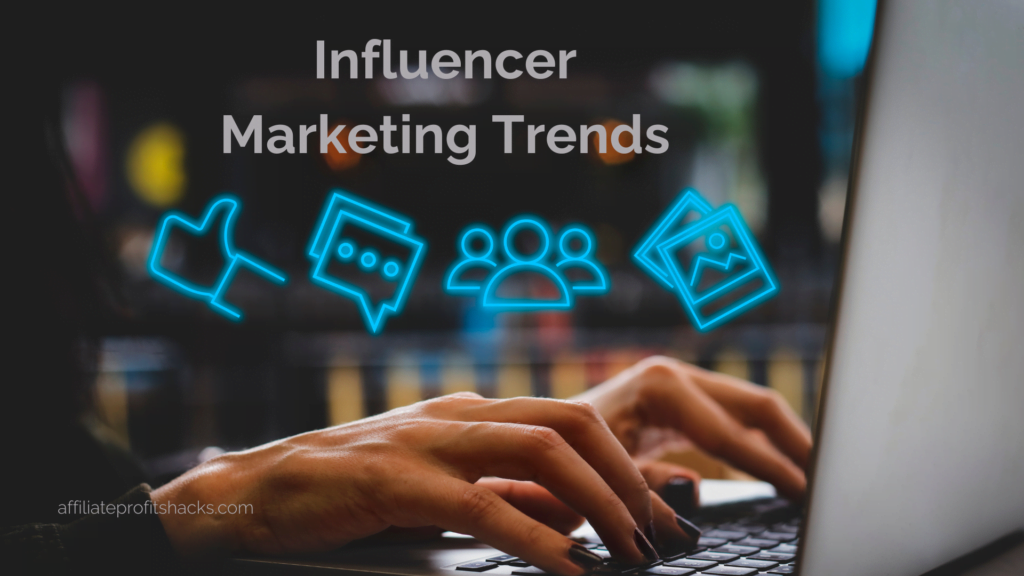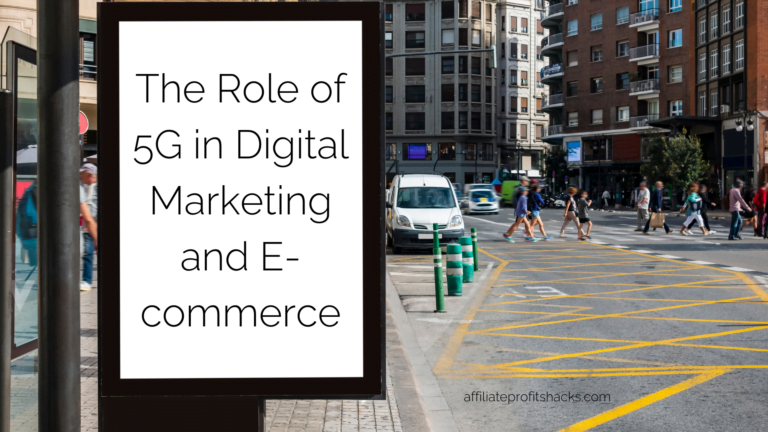Influencer Marketing in 2024: Industry That Will Dominate
Influencer marketing has become an integral part of the digital landscape, with influencers as the primary medium for brands to connect with consumers. In 2024, several trends are expected to dominate the influencer marketing industry.
These trends include the integration of artificial intelligence, the prioritization of micro-influencers, a focus on influencer podcasts, social media as a search engine, converging influencer and affiliate marketing, and more. These trends will shape the future of influencer marketing and help brands maximize their visibility.
Best Recommended and Proven Way to Make Money Online – Click HERE for Instant ACCESS >>

Stay tuned as we dive deeper into these trends and explore how they will transform the influencer marketing landscape in 2024. From utilizing artificial intelligence to empowering micro-influencers, we will unravel the strategies and tactics that will drive success in the ever-evolving world of influencer marketing. Discover how leading brands leverage these trends to captivate their audience, boost engagement, and achieve outstanding results.
Artificial intelligence integration
Artificial intelligence (AI) transforms influencer marketing, revolutionizing how brands connect with their target audience. With the integration of AI in influencer marketing, platforms like Upfluence are streamlining the marketing process and helping brands discover industry-relevant influencers more efficiently.
AI tools like chatbots and algorithms are crucial in analyzing data, finding influencers, and automating various tasks. These AI integrations are expected to become the norm in the coming years, reshaping the structures of influencer marketing platforms and enhancing the efficiency of brand-influencer collaborations.
By leveraging AI, brands can unlock invaluable insights into consumer behavior, preferences, and trends, enabling them to make data-driven decisions when selecting influencers for their campaigns. AI saves time and enhances targeting capabilities, ensuring brands connect with the most relevant influencers who align with their target audience.
Furthermore, AI-powered algorithms can help identify influencers with fake followers or engagement, allowing brands to ensure authenticity and transparency in their partnerships. By eliminating fraudulent influencers, brands can maximize the impact of their influencer marketing campaigns and build trust with their consumers.
AI integration in influencer marketing is set to revolutionize the industry, empowering brands to make more informed decisions, optimize their strategies, and create impactful collaborations with influencers.
Micro-influencer prioritization
In 2024, brands are recognizing the importance of micro-influencers in influencer marketing. These influencers have a smaller follower count, but their impact is significant. With higher engagement rates and a genuine connection with their audience, micro-influencers are trusted sources for product recommendations. They create close-knit communities and foster relationships with their followers, making their marketing efforts relatable and authentic.
Micro-influencers prioritize building genuine connections rather than focusing solely on superficial promotion. Their smaller follower count allows them to engage with their audience more personally, increasing trust and loyalty among their followers. Brands are shifting their focus towards micro-influencers as they realize the value of these influencers in connecting with their target audience.
Micro-influencers are perceived as more trustworthy by their audience. They have a real impact on their followers’ purchasing decisions, as their recommendations are viewed as genuine and unbiased. Brands who prioritize micro-influencers in their influencer marketing strategy can tap into these valuable relationships to drive brand awareness and increase conversions.
The Importance of Micro-influencers in Influencer Marketing
Micro-influencers play a crucial role in influencer marketing because they can effectively reach and engage with their audience. Their niche expertise and authentic voice make them relatable to their followers, resulting in more meaningful connections and higher trust. This trust translates into increased brand credibility and the potential for higher conversion rates.
Brands can benefit from the prioritization of micro-influencers by partnering with them to promote their products or services. Collaborating with micro-influencers allows brands to tap into their existing communities and leverage their influence to generate buzz and drive sales. Additionally, micro-influencers often have a more targeted audience, ensuring that brands can effectively reach their target market.
Overall, micro-influencers offer a unique perspective and connection with their followers, creating a valuable opportunity for brands to promote their products authentically. By prioritizing micro-influencers in influencer marketing strategies, brands can maximize their reach and establish genuine connections with their target audience.
A heightened focus on influencer podcasts
Influencer podcasts are gaining popularity and are expected to be a major trend in 2024. Influencers use podcasts as a powerful medium to foster deeper connections with their followers and attract new audiences. By creating captivating audio content, influencers can share their knowledge, experiences, and insights in a more personalized and intimate format.
Podcasts offer a unique platform for influencers to showcase their expertise and engage with their audience on a deeper level. Listeners can tune in to hear their favorite influencers share valuable advice, conduct interviews with industry experts, or discuss current trends and topics within their niche. Podcasts’ conversational and intimate nature allows for a more authentic and unfiltered connection between the influencer and their audience.
Influencer podcasts provide an opportunity for influencers to establish themselves as industry thought leaders and build a loyal community of listeners.
Best Recommended and Proven Way to Make Money Online – Click HERE for Instant ACCESS >>
With the growing listenership of podcasts, brands have recognized the potential of collaborating with influencers on podcast sponsorships. By aligning their brand with a relevant influencer podcast, brands can reach an active and engaged audience that is receptive to their message. Podcast sponsorships allow brands to seamlessly integrate their products or services into the podcast content, providing a non-intrusive and effective way to connect with their target market.
In addition to sponsorships, brands can leverage the power of influencer podcasts by appearing as guests on episodes. This not only allows brands to share their expertise but also allows them to tap into the influencer’s established audience and gain exposure to new potential customers.
Influencer podcasts have a significant impact on the digital marketing landscape. They provide a platform for influencers to showcase their authenticity, expertise, and personality while offering brands a unique way to engage with their target audience. As the trend of influencer podcasts continues to grow, brands should consider incorporating this medium into their marketing strategies to stay relevant and connect with consumers in a more meaningful and captivating way.
Social media as a search engine
Social media platforms have evolved beyond mere entertainment and social connection platforms. Increasingly, users, especially the younger generation, are turning to social media platforms like TikTok and Instagram as search engines to find information, discover new products, and explore trending topics.
With the rise of social media as a search tool, brands have recognized the importance of investing in influencer marketing to reach their target audience through organic user-generated content. Instead of relying solely on traditional advertising or SEO, brands leverage the influence of social media platforms to connect with consumers more authentically and engagingly.
Now, more than ever, influencers play a crucial role as search facilitators. Their content and recommendations shape users’ purchasing decisions, making influencer marketing an effective strategy for brands to improve their visibility and engage with their desired audience.
TikTok and Instagram as Search Tools
TikTok, the rapidly growing short-form video platform, has become a popular search tool due to its vast range of user-generated content. TikTok has become a go-to platform for users seeking information and entertainment, from discovering the latest dance trends to exploring cooking hacks or finding product recommendations.
On the other hand, Instagram has evolved into an influential visual search engine. With features like hashtags, explore pages and user-curated content, Instagram enables users to discover new brands, products, and trends. From fashion inspiration to home decor ideas, Instagram has become a visual search tool that users turn to for inspiration and information.
As social media platforms continue to evolve, brands must adapt their marketing strategies to incorporate social media as a search engine. By aligning their brand with relevant influencers and creating authentic content, brands can tap into the power of social media platforms to connect with their target audience organically.
Through influencer marketing, brands can leverage the popularity and credibility of influencers on platforms like TikTok and Instagram to drive brand awareness, increase engagement, and, ultimately, boost sales. Influencers act as key opinion leaders, guiding users through their purchasing journey and helping them make informed decisions.
As the influence of social media as a search engine continues to grow, brands need to recognize the significance of investing in influencer marketing as an integral part of their digital marketing strategy. By harnessing the power of social media platforms and collaborating with influencers, brands can effectively reach their target audience more engagingly and authentically.
The convergence of influencer and affiliate marketing
The power of influencer marketing and affiliate marketing is becoming increasingly intertwined as brands recognize the benefits of combining these strategies. By leveraging the influence of trusted influencers and implementing affiliate marketing techniques, brands can drive results and maximize their return on investment.
Influencers play a crucial role in this convergence by using affiliate links or codes to track the sales generated through their promotional efforts. These unique links or codes allow influencers to earn commissions based on the performance of their affiliate marketing campaigns. By incentivizing influencers with commissions, brands can build long-term partnerships and cultivate a network of influencers committed to driving sales and delivering tangible results.
Using affiliate links or codes also adds more authenticity to influencer promotions. Consumers prioritize genuine recommendations from trusted influencers, and including affiliate links reinforces the idea that the influencer has a personal stake in the product or service they endorse.
Influencer marketing and affiliate marketing are a natural fit for each other, as they both rely on the power of recommendations and personal connections.
This convergence allows brands to invest their resources strategically by identifying influencers who consistently drive results. By analyzing the performance of different affiliate codes, brands can measure the effectiveness of influencers and make informed decisions when allocating their marketing budgets. This data-driven approach ensures that brands optimize their influencer partnerships and focus on influencers who generate the highest return on investment.
The marriage of influencer and affiliate marketing also offers brands flexibility in their collaborations. Brands can establish commission structures based on the influencer’s reach, engagement, or sales performance. This versatility allows brands to cater their partnerships to each individual influencer, ensuring fair compensation and fostering a mutually beneficial relationship.
Furthermore, this convergence also empowers brands to reallocate resources from underperforming influencers to those who consistently deliver strong results. By closely monitoring affiliate code performance, brands can identify influencers who may not meet their targets and make informed decisions about whether to continue collaborating with them. This data-driven optimization ensures that brands maximize their ROI and build a network of influencers that align with their marketing objectives.
Best Recommended and Proven Way to Make Money Online – Click HERE for Instant ACCESS >>
The Future of Influencer and Affiliate Marketing
The convergence of influencer and affiliate marketing is a trend that will continue to shape the industry in the coming years. As brands strive to build authentic connections with their target audience, combining these strategies offers a powerful solution. By leveraging the influence of trusted influencers, brands can tap into their engaged and loyal followers and drive impactful results through effective affiliate marketing techniques.
Employees as influencers
Brands have come to recognize the immense value of their own employees as influencers in the digital marketing space. By encouraging employees to share their experiences and expertise on social media, brands can tap into the authentic and genuine connections between employees and their own networks.
Employees’ power as influencers lies in their ability to create content that resonates with their target audience. Unlike traditional influencers, employees understand their company’s products, services, and values. This knowledge allows them to craft engaging content that showcases the brand’s unique aspects.

Employees sharing their experiences and expertise creates a sense of authenticity and ingenuity. Consumers are more likely to trust recommendations and content created by someone they perceive as a knowledgeable insider. Employee-created content can significantly impact consumer perceptions, helping drive sales and increase brand loyalty.
Brands that leverage their employees as influencers can generate content that speaks directly to their target audience. Employees can provide insights, tips, and behind-the-scenes glimpses into the brand, offering a perspective that is both relatable and trustworthy.
Moreover, employee influencers can serve as brand ambassadors, embodying the company’s values and culture. By showcasing the passion and dedication of their own employees, brands can strengthen their brand image and build a loyal customer base.
Overall, the influence of employees can be a powerful asset in influencer marketing campaigns. Brands that recognize the value of their employees as influencers can tap into their unique perspectives, authenticity, and expertise to create compelling content that resonates with their target audience.
Diversity and representation
Inclusivity and diversity are paramount in today’s influencer marketing landscape. Brands understand the significance of representing underrepresented communities and ensuring inclusivity in their advertising campaigns. As part of this movement, influencer agencies dedicated to expanding representation have emerged, fostering collaborations between brands and influencers from diverse backgrounds.
By embracing diversity and representation, brands can tap into a wider audience and connect with consumers who crave authentic and relatable content. Inclusive influencer marketing opens doors to unique perspectives and cultural experiences that resonate with diverse consumers.
Inclusivity allows brands to create campaigns that reflect the real world and its consumers, fostering deeper connections and loyalty.
By collaborating with influencers from underrepresented communities, brands demonstrate their commitment to inclusivity and establish a positive brand image. In turn, this builds trust with consumers and cultivates long-lasting relationships.
The Power of Representation
Representation in influencer marketing is not just about showcasing diversity; it is about giving a voice to communities that have historically been marginalized. By featuring influencers from diverse backgrounds, brands can empower individuals and celebrate their unique stories, cultures, and experiences. This authenticity resonates with audiences and fosters a sense of belonging.
- Representation matters: Inclusive influencer marketing helps consumers see themselves as part of a brand’s story, fostering a deeper connection and driving brand loyalty.
- Breaking stereotypes: By challenging and promoting diversity, brands can change societal perceptions and create a more inclusive world.
- Driving social change: Brands can foster inclusivity and inspire positive social change by amplifying underrepresented voices through influencer collaborations.
As we move into 2024, the importance of diversity and representation in influencer marketing will continue to shape the industry. By embracing inclusivity and partnering with influencers from diverse backgrounds, brands can create meaningful connections, expand their reach, and make a lasting impact on their target audience.
UGC as a primary digital marketing method
User-generated content (UGC) has emerged as a powerful tool in influencer marketing. Influencers have revolutionized how brands promote their offerings by inspiring their followers to create unsponsored content showcasing products and sharing positive experiences. This authentic UGC significantly impacts brand awareness and conversions, as viewers trust recommendations from fellow consumers. In response to this trend, brands are leveraging UGC to catapult their marketing campaigns, both with the help of influencers and everyday consumers.
Utilizing UGC in marketing campaigns allows brands to tap into the power of authentic recommendations and relatable content. It provides an organic way to engage consumers and encourages them to participate actively in the brand’s narrative. By involving consumers in creating and sharing content, brands can build stronger connections and foster a sense of community, increasing brand loyalty and customer retention.
Incorporating UGC in influencer marketing campaigns enables brands to showcase their products in a more relatable and genuine way. Instead of relying solely on branded content, UGC highlights real-life experiences and testimonials, resonating with consumers on a deeper level. This approach allows brands to leverage the influence of their target audience, extending the reach of their marketing efforts.
Moreover, UGC allows for greater diversity in content creation and representation. By involving a wide range of individuals in the content creation process, brands can showcase a variety of perspectives and experiences. This inclusivity enhances the campaign’s authenticity and reflects the diverse makeup of the consumer base. It helps brands connect with a broader audience and fosters a sense of inclusivity and belonging.
Best Recommended and Proven Way to Make Money Online – Click HERE for Instant ACCESS >>
UGC has emerged as a primary digital marketing method within influencer marketing. By leveraging the power of authentic content created by influencers and everyday consumers, brands can establish a deeper connection with their target audience and create a more engaging and relatable brand experience. Incorporating UGC allows brands to harness the power of authentic recommendations, tap into diverse perspectives, and maximize the impact of their influencer marketing campaigns.
Influencer product collections
As the influencer marketing landscape evolves, influencers serve as brand ambassadors and venture into the world of product creation. Branded collections by influencers are becoming increasingly popular, offering curated products tailored for their dedicated followers.
The value of influencer product collections lies in their authenticity. Unlike traditional celebrity endorsements, influencer collections represent a more genuine and personal connection between influencers and their audience. Followers trust the recommendations and creativity of their favorite influencers, making these branded collections highly sought after.
The demand for influencer product collections is rising as consumers yearn for unique and exclusive items associated with their beloved influencers. Recognizing this trend, brands collaborate with influencers, allowing them to create their own collections to meet the expectations of their dedicated fanbase. By doing so, influencers and brands benefit from the influence and loyalty built over time.
These collections enable influencers to monetize their content beyond sponsored posts while allowing their followers to support and connect with them on a deeper level. For brands, influencer product collections offer a unique marketing strategy to tap into the influencer’s expansive reach and passionate following.
The growth of influencer product collections signifies a shift in consumer behavior and preferences. Instead of mere endorsement, consumers crave a more personal connection with the influencers they admire. By leveraging their influence and creativity, influencers meet this demand and establish themselves as influential figures in commerce.
Conclusion
Influencer marketing in 2024 is poised for significant growth and transformation, driven by emerging digital and influencer marketing trends. Brands are adapting strategies to leverage these trends and stay ahead in the ever-evolving influencer marketing landscape.
One of the key trends shaping the future of influencer marketing is the integration of artificial intelligence (AI). AI-powered platforms like Upfluence are revolutionizing the industry, streamlining the marketing process, and enabling brands to discover and collaborate with industry-relevant influencers more efficiently.
Another trend to watch is the prioritization of micro-influencers. These influencers, with their smaller follower counts, boast higher engagement rates and are perceived as more trustworthy. Brands leverage their authenticity and relatability to create meaningful connections with their target audience.
Additionally, influencers are leveraging the power of podcasts to deepen connections with their followers and attract new audiences. Influencer podcasts provide a captivating storytelling medium and valuable sponsorship opportunities for brands to reach an active and engaged audience.
Social media platforms like TikTok and Instagram are also emerging as search engines, enabling brands to connect with consumers organically. By tapping into the influence of these platforms and leveraging user-generated content (UGC), brands can establish authentic and engaging connections with their target audience.
Furthermore, influencer and affiliate marketing convergence is blurring the lines between these strategies. Brands align themselves with influencers who drive results, using influencer affiliate links or codes to measure their effectiveness and provide genuine recommendations to their audience.
With employees becoming influencers themselves, brands are harnessing the power of their own workforce to create authentic content that resonates with their target audience. This approach adds a sense of authenticity and ingenuity to their marketing efforts.
Moreover, diversity and representation have become vital considerations in influencer marketing. Brands actively work towards inclusivity by collaborating with influencers from diverse backgrounds, representing underrepresented communities, and fostering a sense of belonging in their campaigns.
Furthermore, the effectiveness of user-generated content (UGC) in driving brand awareness and conversions cannot be underestimated. Influencers and everyday consumers sharing unsponsored content showcasing products and their experiences significantly impact consumer perceptions and trust.
Lastly, influencer product collections curated by influencers are gaining popularity, giving brands access to the dedicated followings of influencers trusted by their audience. These collections offer a more genuine alternative to traditional celebrity endorsements.
Best Recommended and Proven Way to Make Money Online – Click HERE for Instant ACCESS >>
By staying abreast of these digital and influencer marketing trends, brands can position themselves for success in 2024 and beyond. Influencer marketing continues to be a powerful tool for brands to connect with consumers, and harnessing these trends will maximize visibility and engagement and ultimately drive success in the dynamic world of influencer marketing.







